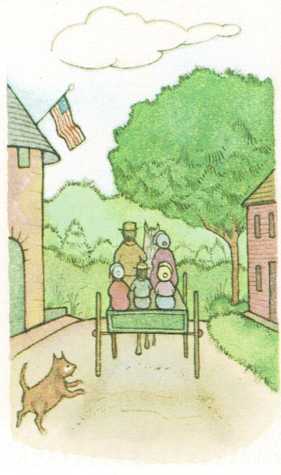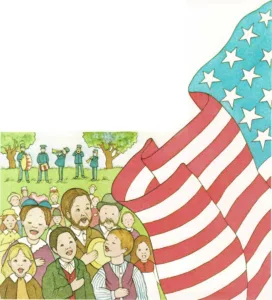Independence Day
by Laura Ingalls Wilder
In this story, taken from the book Farmer Boy, young Almanzo Wilder
enjoys the Fourth of July as it was celebrated in northern New York more
than a hundred years ago. Almanzo also learns how much fifty cents is
really worth.
The Square was not really square. The railroad made it three-cornered.
But everybody called it the Square, anyway. It was fenced, and grass
grew there. Benches stood in rows on the grass, and people were filing
between the benches and sitting down as they did in church.
Almanzo went with Father to one of the best front seats. All the
important men stopped to shake hands with Father. The crowd kept coming
till all the seats were full, and still there were people outside the
fence.
The band stopped playing, and the minister prayed. Then the band tuned
up again and everybody rose. Men and boys took off their hats. The band
played, and everybody sang.
Oh! say, can you see, by the dawn’s early light, What so proudly we
hailed at the twilight’s last gleaming?
Whose broad stripes and bright stars, thro’ the perilous fight,
O’er the ramparts we watched were so gallantly streaming?
From the top of the flagpole, up against the blue sky, the Stars and
Stripes were fluttering. Everybody looked at the American flag, and
Almanzo sang with all his might.
Then everyone sat down, and a Congressman stood up on the platform.
Slowly and solemnly he read the Declaration of Independence.
\”When in the course of human events it becomes necessary for one people
… to assume among the powers of the earth the separate and equal
station. … We hold these truths to be self-evident, that all men are
created equal. . . .”
Almanzo felt solemn and very proud.
Then two men made long political speeches. One believed in high tariffs,
and one believed in free trade. All the grown-ups listened hard, but
Almanzo did not understand the speeches very well and he began to be
hungry. He was glad when the band played again.
The music was so gay; the bandsmen in their blue and red and their brass
buttons tootled merrily, and the fat drummer beat rat-a-tat-tat on the
drum. All the flags were fluttering and everybody was happy, because
they were free
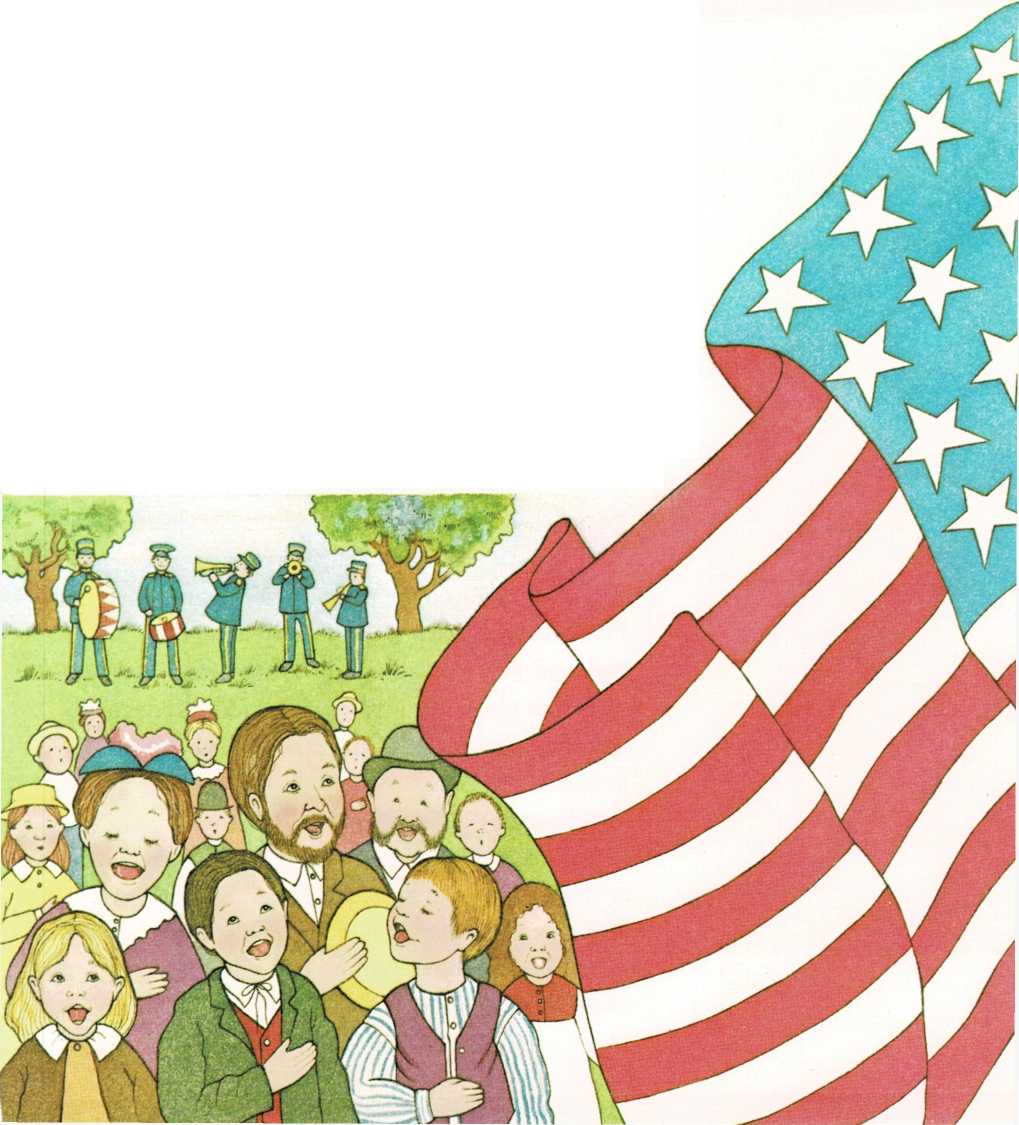
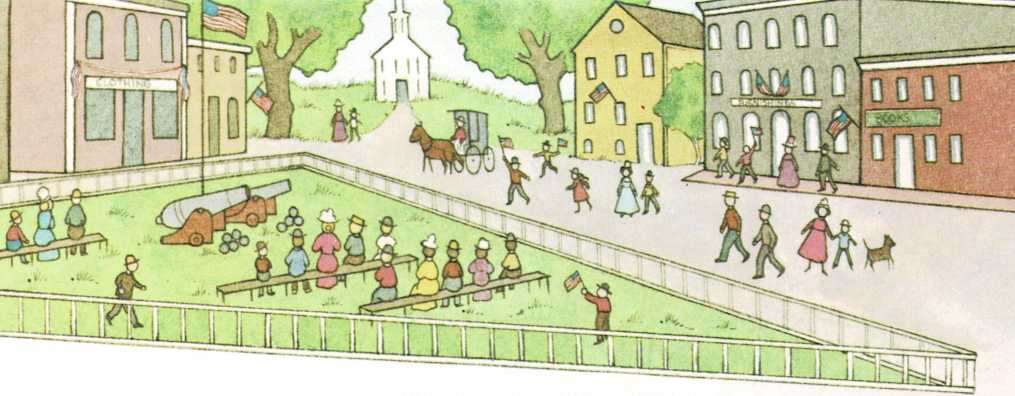
and independent and this was Independence Day. And it was time to eat
dinner.
Almanzo helped Father feed the horses while Mother and the girls spread
the picnic lunch on the grass in the churchyard. Many others were
picnicking there, too, and after he had eaten all he could Almanzo went
back to the Square.
There was a lemonade-stand by the hitching- posts. A man sold pink
lemonade, a nickel a glass, and a crowd of the town boys were standing
around him. Cousin Frank was there. Almanzo had a drink at the town
pump, but Frank said he was going to buy lemonade. He had a nickel. He
walked up to the stand and bought a glass of the pink lemonade and drank
it slowly. He smacked his lips and rubbed his stomach and said:
\”Mmmm! Why don’t you buy some?”
\”Where’d you get the nickel?” Almanzo asked. He had never had a nickel.
Father gave him a penny every Sunday to put in the collection-box in
church; he had never had any other money.
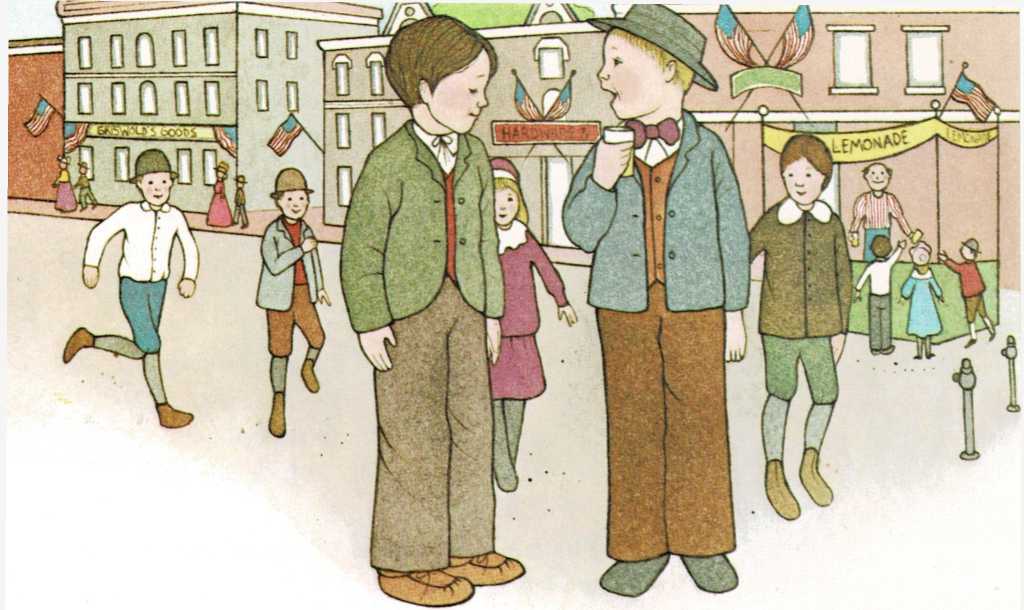
\”My father gave it to me,” Frank bragged. \”My father gives me a nickel
every time I ask him.”
\”Well, so would my father if I asked him,” said Almanzo.
\”Well, why don’t you ask him?” Frank did not believe that Father would
give Almanzo a nickel. Almanzo did not know whether Father would, or
not.
\”Because I don’t want to,” he said.
\”He wouldn’t give you a nickel,” Frank said.
\”He would, too.”
\”I dare you to ask him,” Frank said. The other boys were listening.
Almanzo put his hands in his pockets and said:
\”I’d just as lief ask him if I wanted to.”
\”Yah, you’re scared!” Frank jeered. \”Double dare! Double dare!”
Father was a little way down the street, talking to Mr. Paddock, the
wagon-maker. Almanzo walked slowly toward them. He was faint-hearted,
but he had to go. The nearer he got to Father, the more he dreaded
asking for a nickel. He had never before thought of doing such a thing.
He was sure Father would not give it to him.
He waited till Father stopped talking and looked at him.
\”What is it, son?” Father asked.
Almanzo was scared. \”Father,” he said.
\”Well, son?”
\”Father,” Almanzo said, \”would you—would you give me—a nickel?”
He stood there while Father and Mr. Paddock looked at him, and he wished
he could get away. Finally Father asked:
\”What for?”
Almanzo looked down at his moccasins and muttered:
\”Frank had a nickel. He bought pink lemonade.”
\”Well,” Father said, slowly, \”if Frank treated you, it’s only right
you should treat him.” Father put his hand in his pocket. Then he
stopped and asked:
\”Did Frank treat you to lemonade?” Almanzo wanted so badly to get the
nickel that he nodded. Then he squirmed and said:
\”No, Father.”
Father looked at him a long time. Then he took out his wallet and opened
it, and slowly he took out a round, big silver half-dollar. He asked:
\”Almanzo, do you know what this is?”
\”Half a dollar,” Almanzo answered.
\”Yes. But do you know what half a dollar is?”
Almanzo didn’t know it was anything but half a dollar.
\”It’s work, son,” Father said. \”That’s what money is; it’s hard work.”
Mr. Paddock chuckled. \”The boy’s too young, Wilder,” he said. \”You
can’t make a youngster understand that.”
\”Almanzo’s smarter than you think,” said Father.
Almanzo didn’t understand at all. He wished he could get away. But Mr.
Paddock was looking at Father just as Frank looked at Almanzo when he
double-dared him, and Father had said Almanzo was smart, so Almanzo
tried to look like a smart boy. Father asked:
\”You know how to raise potatoes, Almanzo?”
\”Yes,” Almanzo said.
\”Say you have a seed potato in the spring, what do you do with it?”
\”You cut it up,” Almanzo said.
\”Go on, son.”
\”Then you harrow—first you manure the field, and plow it. Then you
harrow, and mark the ground. And plant the potatoes, and plow them, and
hoe them. You plow and hoe them twice.”
\”That’s right, son. And then?”
\”Then you dig them and put them down cellar.”
\”Yes. Then you pick them over all winter;
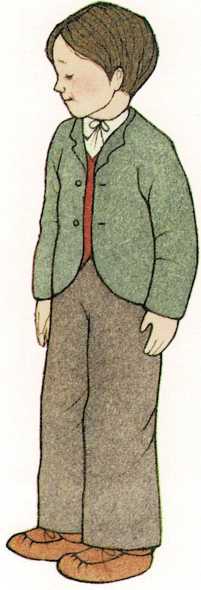
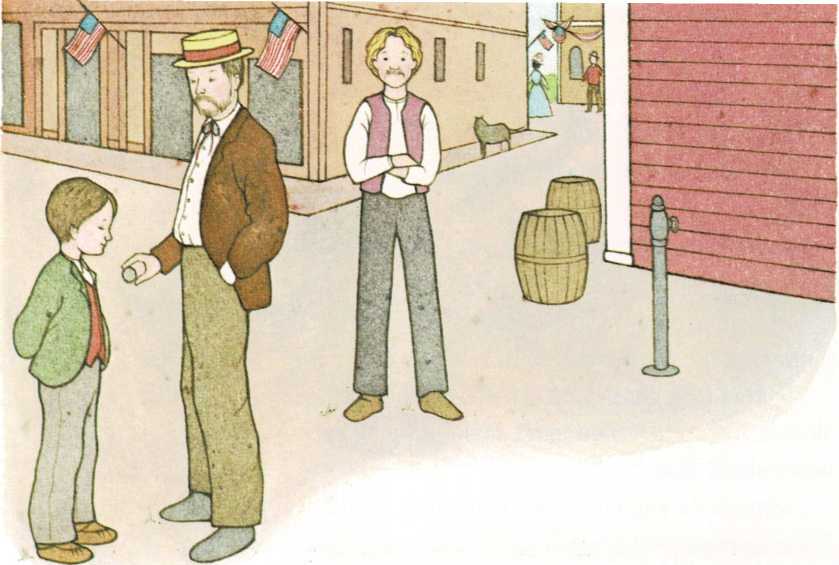
you throw out all the little ones and the rotten ones. Come spring, you
load them up and haul them here to Malone, and you sell them. And if you
get a good price, son, how much do you get to show for all that work?
How much do you get for half a bushel of potatoes?”
\”Half a dollar,” Almanzo said.
\”Yes,” said Father. \”That’s what’s in this half-dollar, Almanzo. The
work that raised half a bushel of potatoes is in it.”
Almanzo looked at the round piece of money that Father held up. It
looked small, compared with all that work.
\”You can have it, Almanzo,” Father said. Almanzo could hardly believe
his ears. Father gave him the heavy half-dollar.
\”It’s yours,” said Father. \”You could buy a sucking pig with it, if
you want to. You could raise it, and it would raise a litter of pigs,
worth four, five dollars apiece. Or you can trade that half-dollar for
lemonade, and drink it up. You do as you want, it’s your money.”
Almanzo forgot to say thank you. He held the half-dollar a minute, then
he put his hand in his pocket and went back to the boys by the
lemonade-stand. The man was calling out,
\”Step this way, step this way! Ice-cold lemonade, pink lemonade, only
five cents a glass! Only half a dime, ice-cold pink lemonade! The
twentieth part of a dollar!”
Frank asked Almanzo:
\”Where’s the nickel?”
\”He didn’t give me a nickel,” said Almanzo, and Frank yelled:
\”Yah, yah! I told you he wouldn’t! I told you so!”
\”He gave me half a dollar,” said Almanzo.
The boys wouldn’t believe it till he showed them. Then they crowded
around, waiting for him to spend it. He showed it to them all, and put
it back in his pocket.
\”I’m going to look around,” he said, \”and buy me a good little sucking
pig.”
The band came marching down the street, and they all ran along beside
it. The flag was gloriously waving in front, then came the buglers
blowing and the fifers tootling and the drummer rattling the drumsticks
on the drum. Up the street and down the street went the band, with all
the boys following it, and then it stopped in the Square by the brass
cannons.
Hundreds of people were there, crowding to watch.
The cannons sat on their haunches, pointing their long barrels upward.
The band kept on playing. Two men kept shouting, \”Stand back!
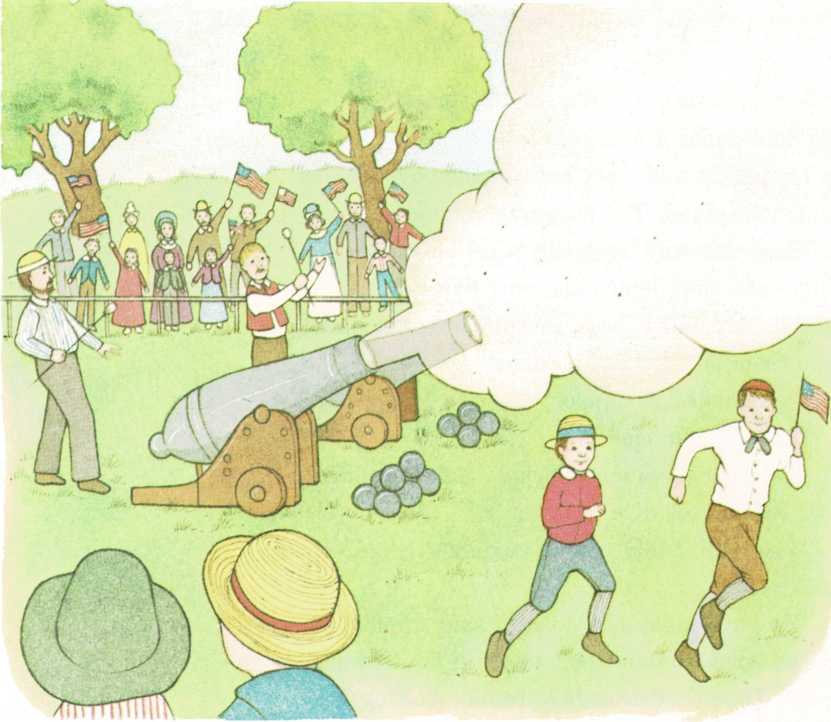
Stand back!” and other men were pouring black powder into the cannons’
muzzles and pushing it down with wads of cloth on long rods.
The iron rods had two handles, and two men pushed and pulled on them,
driving the black powder down the brass barrels. Then all the boys ran
to pull grass and weeds along the railroad tracks. They carried them by
armfuls to the cannons, and the men crowded the weeds into the cannons.’
muzzles and drove them down with the long rods.
A bonfire was burning by the railroad tracks, and long iron rods were
heating in it.
When all the weeds and grass had been packed tight against the powder in
the cannons, a man took a little more powder in his hand and carefully
filled the two little touchholes in the barrels. Now everybody was
shouting, \”Stand back! Stand back!\”
Mother took hold of Almanzo’s arm and made him come away with her. He
told her:
\”Aw, Mother, they’re only loaded with powder and weeds. I won’t get
hurt, Mother. I’ll be careful, honest.” But she made him come away from
the cannons.
Two men took the long iron rods from the fire. Everybody was still,
watching. Standing as far behind the cannons as they could, the two men
stretched out the rods and touched their red-hot tips to the touchholes.
A little flame like a candle-flame flickered up from the powder. The
little flames stood there burning; nobody breathed. Then—BOOM!
The cannons leaped backward, the air was full of flying grass and weeds.
Almanzo ran with all the other boys to feel the warm muzzles of the
cannons. Everybody was exclaiming about what a loud noise they had made.
\”That’s the noise that made the Redcoats run!” Mr. Paddock said to
Father.
\”Maybe,” Father said, tugging his beard. \”But it was muskets that won
the Revolution. And don’t forget it was axes and plows that made this
country.”
\”That’s so, come to think of it,” Mr. Paddock said.
Independence Day was over. The cannons had been fired, and there was
nothing more to do but hitch up the horses and drive home to do the
chores.
If you enjoyed this story, you will want to read the rest of Farmer
Boy, as well as all the other books in the \”Little House” series.
